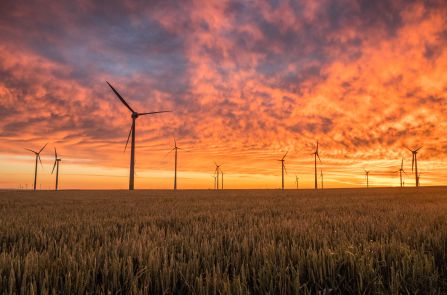
In a Climate Advisers report, Nigel Purvis and Joshua D. McBee highlight the importance of creating supply chains for essential technologies and argue that “clean energy security” should be a priority for the Biden government. The report takes a look at the United States’ (U.S.) clean energy policies, mainly its domestic approach to mining and manufacturing key minerals, and recommends a more comprehensive global approach, which involves working with the U.S.’s closest allies (including Canada, Europe, and Japan) to create new international clean energy supply chain initiatives. Purvis and McBee argue that “[t]he United States should work with these allies to strengthen relevant international institutions to help manage clean supply chain issues globally”.
Neglecting the global market and focusing only on domestic supply chains puts the U.S. and other states at risk of failing to meet global climate goals. Many states around the world are unable to source the necessary materials and technologies need to decarbonize and would therefore benefit from a stronger, more decentralized clean energy supply chain. As the report highlights, “clean energy security depends not only on what the [U.S. does] but also on whether other nations have affordable and reliable clean energy supply chains”.
The Risks
The largest sources of climate pollution in most industrialized nations are electricity production and transportation. Decarbonizing these sectors over the next couple decades requires an abundant and affordable supply of wind turbines, solar panels, and electric vehicles (EVs), as well as advanced batteries and updated power transmission infrastructure systems. States will also need to ramp up supplies of green liquid fuels, such as hydrogen and ammonia. Other renewable energy technologies at earlier stages of development, such as geothermal, tidal, and wave energy, could also play a vital role, as could fuel cells.
Many of these technologies require large quantities of critical minerals, some of which – specifically EVs, wind turbines, and solar panels – require more than the technology they are replacing. Consequently, demand for these minerals is projected to increase as more states work to decarbonize and meet their climate targets. Critical mineral mining and processing also tends to be concentrated specifically in a handful of countries, including the DRC, China, Australia, Indonesia, and Chile. China manufactures and processes significantly more than other countries. About 78% of the world’s cell manufacturing capacity is in China.
This high degree of concentration in critical mineral mining and processing makes clean energy supply chains particularly vulnerable to natural disasters, the effects of climate change, and unrest or armed conflict in producer countries. Geopolitical tensions also play a role as producing states can use their dominant position in clean energy supply chains to punish adversaries, in the same way Russia has as Europe’s main supplier of natural gas.
In addition, clean energy supply chains are connected to a host of environmental and social harms. Mining has been linked to deforestation which accounts for 16-19% of annual global greenhouse gas emissions, erodes biodiversity, and could have significant impacts on natural ecosystems. There are reports of corruption and exploitation in the sectors. For example, reports of cobalt mines in the Democratic Republic of Congo employing child labor, and many solar panels produced by Chinese companies relying on forced labor by Muslims detained in China’s Xinjiang region. Policymakers must consider these risks carefull and take steps to prevent further harms.
The Recommendations
The Biden administration is working to secure clean energy supply chains within the U.S. however, an international approach will ensure that climate goals can be met and mitigate the risks of the current global clean energy supply chain. This begins with ensuring that all states have reliable access to abundant and affordable critical minerals and clean technologies. As Purvis and McBee argue, “U.S. climate champions need to actively promote a fuller, more expansive concept of clean energy security than the one that experts are advancing today in most policy circles in Washington, DC.”
The U.S. should focus on working with its closest allies to make clean energy supply chains more reliable, resilient, and affordable for all nations, particularly in countries with the largest emissions.
The task is immense, and it is not feasible or possible for the U.S. to try to enhance the supply chain for all the states in the world. Therefore, focusing on the U.S.’s closest allies and largest trading partners is a significant first step. Improving clean energy security with states like Canada, Japan, Europe and other democracies that are members of the Organization for Economic Cooperation and Development, will also enhance U.S. energy security through interconnected supply chains.
While global clean energy security should be a long-term U.S. objective, today the U.S. should prioritize policy coordination with a far smaller group of likeminded developed nations that are major U.S. trading partners.
Another recommendation, as proposed by German chancellor Olaf Scholz, is the creation of one or more trade-based international climate alliances to decarbonize the industrial sectors. A ‘climate alliance’ would expand markets for green technologies and essential minerals, encourage the sourcing of clean goods from reliable and stable democracies, and provide a platform for adopting a full range of clean energy security policies within a like-minded group.
Lastly, the U.S. should focus on working with global partners on enhancing the international institutions that regulate clean energy security and focus on political coordination, policy and technical cooperation, and international governance.
These recommendations and a global approach to improving the security of clean energy supply chains can significantly reduce the risk that resource scarcity, social and environmental harms, or political instability will impede efforts to meet global climate goals. By working with close allies includes Canada, Japan, and Europe, climate ambition can be sustained and achieved.
The report , Risks to Sustaining Climate Action: Why securing clean energy supply chains requires a global perspective by Nigel Purvis and Joshua D. McBee, was published in May 2022 by Climate Advisers. The report is available to read here.
